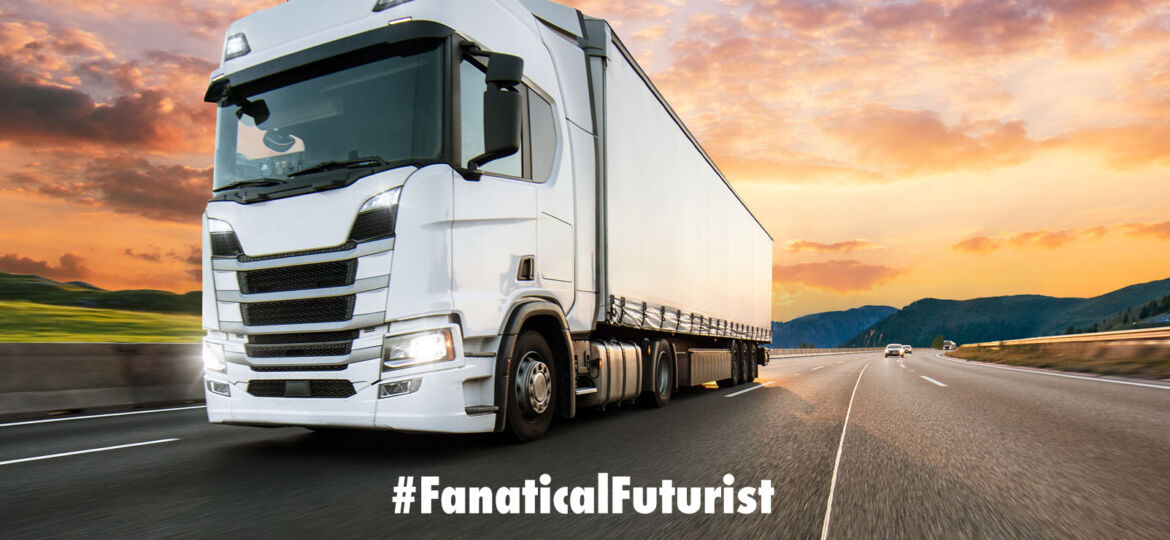
WHY THIS MATTERS IN BRIEF
During a time when people aren’t allowed out of their houses self-driving trucks are helping keep freight moving in the US.
 Interested in the Exponential Future? Connect, download a free E-Book, watch a keynote, or browse my blog.
Interested in the Exponential Future? Connect, download a free E-Book, watch a keynote, or browse my blog.
In spite of some amazing technological innovations and the pioneering human spirit, the coronavirus pandemic, COVID-19, now has over half the world’s population in lock down, has been responsible for shutting down global airspace, and, as we scan over to another segment of the transportation industry has temporarily halted test fleets of some of the biggest self-driving tech companies. But all that said self-driving truck developer TuSimple is bucking the trend, and as human truck drivers are furloughed or banned from travelling, the company is now running its semis around the clock across the Southwest US, hauling much-needed freight, mail and food amid a worsening health crisis. It’s also lined up an important new partnership with parts supplier ZF.
San Diego-based TuSimple, which operates also a separate unit in China, has more than 40 18-wheelers operating out of its depot in Tucson, Arizona, and is “essentially running 24/7” carrying loads between Phoenix and El Paso, Texas, said chief product officer Chuck Price. It’s a tiny freight operation compared to the massive fleets of national haulers like J.B. Hunt, Swift, Werner and Amazon, each with thousands of trucks and drivers, but no company has more self-driving semis than TuSimple, based on the most recent US Transportation Department registry data.
“We’re quite busy. We’re hauling for UPS, which is a critical part of the infrastructure, the US Postal Service, which is similarly part of the critical infrastructure, and Berkshire Hathaway’s McLane, which delivers food everywhere – grocery stores, restaurants, everywhere,” Price says. Those are paid deliveries, but it’s also begun hauling supplies free of charge for the Arizona Food Bank. Privately held TuSimple doesn’t disclose revenue from freight operations.
During the current pandemic trucking is designated an essential service, and that’s particularly obvious given the need to keep restocking stores light on inventory after the panic-buying of consumer staples as the crisis unfolded.
“We looked at that and said, ‘We can’t stop.’ If we did stop, maybe it’s a drop in the bucket for them, but it’s important and we felt we needed to continue,” Price says. “We’re able to do autonomy, but we’re also able to help in our tiny way to keep the infrastructure going. It’s sort of a learning experience for all of us.”
The coronavirus pandemic struck as dozens of companies, including Alphabet’s Waymo and General Motors-backed Cruise, Ford’s Argo AI, Uber, Silicon Valley startups Aurora and Zoox and Nuro, a SoftBank-backed maker of small robotic delivery vans, were all working to perfect safe, commercially viable autonomous vehicles. But all remain at relatively early stages of deployment. TuSimple is one of the few that’s been able to maintain regular operations, albeit with big changes to limit the risk of staff being exposed to the virus.
Cofounded by president and tech chief Xiaodi Hou, TuSimple shifted to work-from-home operations for tech and development staff earlier this month and scaled back the number of people working at its Tucson engineering depot to limit physical contact there. Its truck cabs are stocked with wipes, masks and gloves and the company has set strict wipe-down rules for the human safety drivers that are always behind the wheel even when the trucks are barreling down the highway in autonomous mode. So far, no TuSimple employee has tested positive for the coronavirus, Price says.
Waymo has temporarily halted its public autonomous ride service in metro Phoenix during the crisis and last week said it’s also halting all on-road testing of self-driving vans as well as its semi-trucks. Likewise, Cruise has idled its test fleet in San Francisco, where it’s preparing to begin a commercial robo-taxi service. The two companies also shifted to work-from-home models because of the virus, and tech staff remain focused on software development and virtual testing of vehicles in computer simulation.
TuSimple also recently announced plans to co-develop key components needed for its self-driving trucks with German parts giant ZF, including electronic steering and computer systems, laser lidar sensors, radar and cameras. ZF will also become the default supplier for Tusimple’s “production-ready” system for higher-volume production vehicles.
“A key success factor for virtual driver software is to ensure the system is based on an automotive-grade level, including component development and production,” Torsten Gollewski, ZF’s executive vice president of autonomous mobility systems, said in a statement. “The combination of ZF automotive system competencies and TuSimple’s virtual driver software will create the first commercial-ready automotive-grade autonomous truck technology platform.”
Along with ZF, TuSimple, which has raised about $300 million to fund operations from investors including Nvidia and UPS, also has technical partnerships with Nvidia, Cummins and Sony.
The company will be raising additional funds and has much more planned for the remainder of 2020, Price says. That includes a second truck depot in Dallas and a lot more trucks.
“We are going to be growing the fleet more this year, substantially,” he said, without elaborating.
















